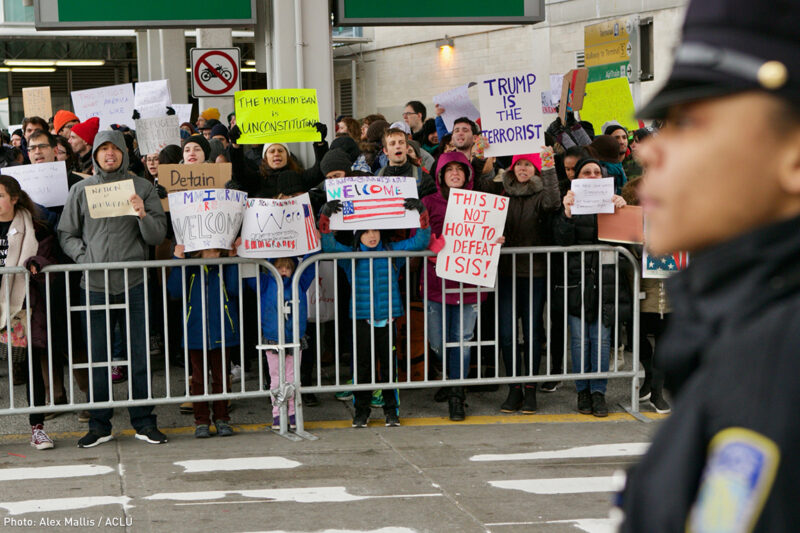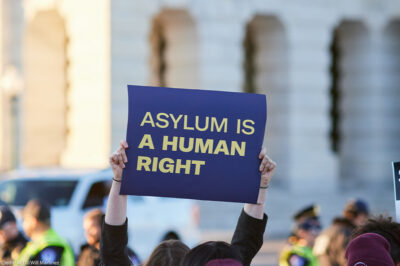
The federal courts have dealt two more blows to President Trump’s ongoing attempt to ban Muslims from entering the United States. The two rulings, issued yesterday in separate lawsuits in Hawaii and Maryland, made clear that the president’s second Muslim ban executive order is just as unconstitutional as the first.
The first blow came yesterday from a federal court in Hawaii. Just hours before the travel ban was scheduled to go into effect at 12:01 a.m. this morning, the court issued a ruling blocking the operative provisions of the executive order — both the ban against people from six predominantly Muslim countries and the provisions blocking refugee resettlement in the United States. The second ruling, in a case brought by the ACLU and the National Immigration Law Center on behalf of clients including the International Refugee Assistance Project and HIAS, came just before 2 a.m. from a Maryland district court. That ruling also blocked the six-country ban.
Urge your senators to oppose Muslim ban 2.0.
The breadth of the Hawaii ruling means that, for now, no part of the executive order can take effect without further input from the courts.
A few main takeaways:
1. Keep talking, Mr. President.
Despite the government’s claims to the contrary, both judges found ample evidence that religious discrimination, in clear violation of the First Amendment’s Establishment Clause, had motivated the executive order. The courts pointed to the words of the president himself, whose various statements during and since his campaign, including his campaign promise of “a total and complete shutdown of Muslims entering the United States,” provided clear evidence of his intent to target Muslims based on religion.
We also have the president’s associates’ words. When Rudy Giuliani boasted that Trump had asked him to craft a Muslim ban that could pass legal muster, and Stephen Miller stated that the second executive order would have the same basic effect as the first, they helped confirm the unlawful purpose.
As a result, despite the changes made to the second order, the U.S. District Court for the District of Maryland noted that “the history of public statements continues to provide a convincing case that the purpose of the Second Executive Order remains the realization of the long-envisioned Muslim ban.”
2. National security was not the point.
The federal court in Maryland, in particular, saw through the Trump administration’s claims that the ban was about national security, pointing to the absence of any evidence suggesting that nationals from the six countries pose a heightened threat to the United States. To the contrary, the court noted, a bipartisan group of former senior U.S. national security officials filed a friend-of-the-court brief stating that no acts of terrorism have been committed by citizens of the six countries since 9/11 and that no intelligence as of January suggested a heightened threat.
To make matters worse, the federal judge noted that the White House never bothered to reach out to national security experts before implementing the first ban. This fact all but destroyed the national security rationale for the Muslim ban, according to the judge:
“In this highly unique case, the record provides strong indications that the national security purpose is not the primary purpose for the travel ban… The fact that the White House took the highly irregular step of first introducing the travel ban without receiving the input and judgment of the relevant national security agencies strongly suggests that the religious purpose was primary, and the national security purpose, even if legitimate, is a secondary post hoc rationale.”
3. Now what?
For now, thanks to the Hawaii decision, both main sections of the executive order are blocked. The Maryland court indicated it will issue a ruling in the near future on the executive order’s illegal reduction of refugee admissions. It’s unlikely that the district courts will have the last word, as the government is likely to appeal these decisions.
And if it does, we will fight those appeals every step of the way.




